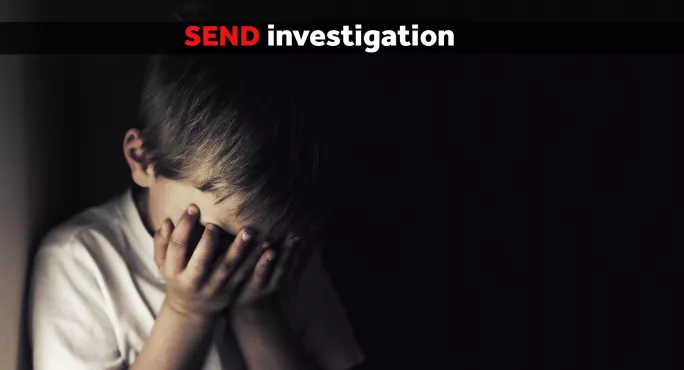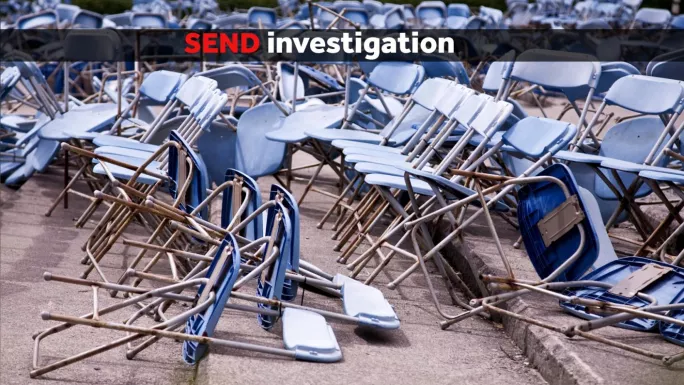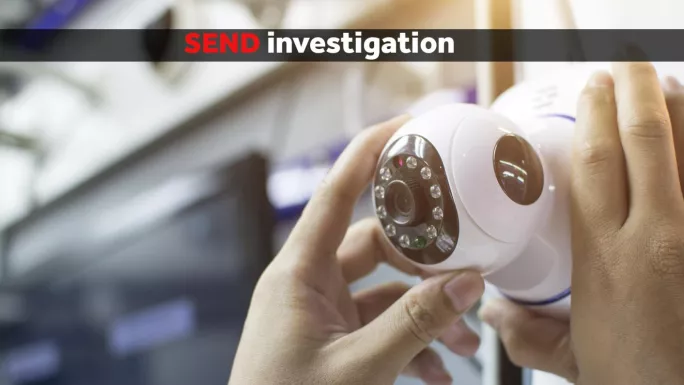- Home
- Two-thirds of latest SEND inspections uncover failings
Two-thirds of latest SEND inspections uncover failings

Significant areas of weakness in the education and support of children with special educational needs and disabilities (SEND) have been uncovered in two-thirds of the areas of England visited by inspectors so far this year.
Inspectors from Ofsted and the Care Quality Commission have ordered authorities to produce a written statement of action - the worst possible inspection outcome - in 17 of the 26 authority areas checked in 2019.
This means that since these inspections began in 2016, more than half of the first 100 areas of the country to be inspected have been found to have significant weaknesses.
Damning inspection reports highlight recurring problems including poor quality of education, health care plans, concerns about the high numbers of children with special needs being excluded or absent from school, poor exam outcomes for SEND children and a lack of confidence among parents in the system.
Blog: How are SEND area inspections carried out?
Background: Council claims too many children going for EHC plan assessment
Campaigners have now urged education secretary Gavin Williamson to take action to tackle a growing crisis.
Gillian Doherty from the SEND Action group said the crisis was being driven by a lack of funding for the local authorities which are responsible for ensuring that children with special educational needs get the support they need - and a lack of accountability when authorities failed to do so.
She said: “The government reforms were good in principle. I think most people supported them - it’s just that councils have been given these extra responsibilities for children with SEND at a time when they have less resources than ever and the results have been catastrophic for families with SEND.”
The inspections were brought in to assess how local areas were implementing government reforms in 2014 which introduced education, health and care plans (EHCPs) for young people with SEND.
The number of areas found to have significant failings and required to produce a written statement of action to set out how they will secure improvements has increased year on year since they first began in 2016.
In the first year, four areas among the first 16 inspections were told to produce written statements of action.
In 2017, the 13 of 29 areas were told to produce statements. But in the past two years, the majority of areas inspected have been told to improve. Last year, 17 of 29 inspections resulted in authorities being told to issue written statements of action.
And so far this year, 65 per cent of inspections of services for children with SEND carried out in 2019 have resulted in authorities being ordered to produce a written statement of action.
The National Deaf Society warned that more than 1 million children with SEND or disabilities now have a less than 50 per cent chance of getting the support they need depending on where they live.
‘This support isn’t a luxury, it’s a legal right’
Steve Haines, the charity’s executive director of policy and campaigns said: “These figures show that support for children with SEND is falling woefully short.
“This support isn’t a privilege or a luxury, it’s a legal right, but these children are now relying on a system where their chances of getting what they need are no better than 50:50.
“Make no mistake, this is a system in crisis and it’s completely unacceptable in a compassionate society. If more than half of schools, hospitals or fire stations were failing, there would be a national outcry.
“This shocking rate of failure simply cannot be tolerated and Gavin Williamson must now act on the promises he’s made to disabled children by getting the new funding straight to the front line and demonstrating exactly how he will fix this broken system.”
Of the 51 areas found to have significant weakness since 2016, just 11 have been reinspected and the majority of these (six) were told by Ofsted and the CQC that they had not made enough progress.
However, there are no plans for Ofsted or the CQC to carry out any more monitoring inspections of these areas which were still found to be failing.
Ofsted says it expects to reinspect areas found to have weaknesses within 18 months of the local statement of actions being approved by the Department for Education.
The SEND area inspections were launched in May 2016.
The reports show widespread concerns that areas have not implemented the government reforms quickly enough and are not meeting the needs of young people in their district.
Ofsted and the CQC regularly identify concerns about the outcomes for young people, the numbers of children with SEND excluded from school, the variable quality of the EHCPs and a lack of parental confidence in the system.
The Local Government Association has blamed the situation on a shortfall in SEND funding and a huge increase in demand for EHCPs since they were introduced in 2014.
Councillor Anntoinette Bramble, the former chair of the Local Government Association’s Children and Young People Board, said: “Councils take their responsibility towards children and young people with special educational needs [and disabilities] (SEND) very seriously, working closely with partners in schools, with health commissioners and providers to provide support to the 354,000 children with EHCPs and their families.
“The LGA was clear at the time that the reforms set out in the Children and Families Act were significantly underfunded and this, combined with big increases in demand for support, which has seen the number of children with EHCPs increase by 35 per cent since 2014, illustrates the serious pressure that the SEND system is under.”
The Department for Education has been approached for comment.
SEND inspections: How the system is failing
Inspections show how children are being let down by delays, poor support plans and exclusions

Inspection reports into the education and support for children and young people with special educational needs and disabilities (SEND) reveal widespread failings across the country.
The SEND area inspection reports are carried out by Ofsted and the Care Quality Commission (CQC). They were introduced in 2016 to check how the government reforms were being implemented.
The inspections look at how areas are identifying children with SEND, whether they are meeting their needs and what the outcomes for young people with SEND are.
Here is a summary of some of the key failings identified in this year’s reports:
Weak education health and care plans
A central change to the system for supporting children with SEND was the creation of education health and care (EHC) plans to replace statements of special needs
The idea is to bring together all service providers to ensure that children’s needs are met.
But inspection reports show major problems with the way the plans are being written and delivered.
Inspectors highlight consistent weaknesses in the quality of EHC plans, plans being out of date and intended targets and outcomes being too vague or lacking aspiration.
They also discovered arbitrary mistakes. In one instance, a plan suggested that a community paediatrician was responsible for a child accessing the curriculum and achieving their academic potential.
In all 17 areas that have been told to produce a statement of action this year, the quality of EHC plans was criticised by Ofsted and the CQC.
Parents and pupils being made to wait
Another recurring theme in the inspection reports is the delay faced by pupils and their families in getting the support they need
Some areas have failed to convert statements into EHC plans on time.
The inspections have also revealed councils struggling to meet the 20-week target for delivering EHC plans after a request for an assessment and not having the capacity to carry out annual reviews.
One authority was criticised for having an unwieldy paper-based EHC plan system that has caused delays.
In other areas, EHC plans have been delivered on time but inspectors described the process as rushed and said the quality of plans suffered as a result.
Some areas have also been criticised for not putting enough focus on young people with SEND and being too slow to implement the government’s reforms.
SEND pupils being excluded
The high number of pupils with SEND being excluded is mentioned in the majority of negative inspection reports this year.
Inspectors found significant increases in the number of children and young people who are permanently excluded from school. In some cases, this leads to them being out of formal education for a considerable period.
Inspectors also found that when young people have either unmet or undiagnosed needs, it can lead to inappropriate exclusions from school.
In one area, children with SEND accounted for nearly three-quarters of all exclusions from schools.
Concerns about exclusion of pupils with SEND has been highlighted in 13 negative inspection reports. Another three say exclusion of pupils with SEND was high in the past but is now being addressed.
Schools being unable or unwilling to meet pupils needs
The SEND area inspections found examples of parents choosing to educate their child at home because they did not think schools can meet their needs.
The reports also reveal that in some cases “significant numbers of children with ASD and social, emotional and mental health difficulties are not having their needs met during primary school”. Parents told inspectors that primary schools in some areas did not understand their child’s difficulties.
Inspectors were also told schools used reduced timetables and temporary exclusions to manage “children’s difficulties”.
Reports also highlight how pupils with SEND struggling at secondary school is leading to higher than expected EHC plan applications in early secondary education.
Parents and leaders raised concerns about the “overall spirit of inclusion in some settings”. One report said: “Too often, inspectors were given examples of pupils with SEND who were finding it hard to gain admission to a school.”
Poor outcomes and results for pupils
In around half of the negative inspection reports, concerns were raised about the progress, standards or outcomes that children and young people with SEND are achieving in school.
Inspectors found that a knock-on effect of high levels of fixed-term and permanent exclusions is that children with SEND are not achieving as well as they should.
Reports also highlighted how in some areas progress of pupils with EHC plans is poor and that the aspirations for them are not high enough.
Concerns about outcomes for pupils was highlighted in eight out of 17 inspection reports this year where local authorities and health bodies have been told to produce a written statement of action.
Parents have lost faith in the system
An unsurprising result from the widespread shortcomings in the system is that parents have lost faith in it.
Reports reveal how poor communication is a contribution to parents feeling “frustration and anger”.
Inspectors say that parents who contributed to the inspection can feel frustrated about getting their children’s needs diagnosed and support put in place.
Parents unhappiness at the SEND provision in their area is mentioned in almost all of the 17 reports this year that had negative outcomes.
Calls for more checks on SEND services that fail
Campaigners call for parts of the country where SEND services have been criticised to face more monitoring inspections

Campaigners have warned that areas of the country that have been found to have shortcomings in their services for children with special educational needs and disabilities (SEND) could go unchecked for several years.
Despite inspections covering systemic failings across the country, Ofsted and the Care Quality Commission can only return to failing areas once to check on their progress.
Since the system of SEND area inspections began, 51 out of the first 100 areas visited have been told to produce written statements of action.
To date, inspection teams have returned to 11 of the areas that had been told to address significant weaknesses in their SEND provision.
Of these 11, six areas have been told that they have not made sufficient progress.
However, under the current inspection system, Ofsted and CQC will not return to carry out more monitoring inspections.
The reports - which found repeated failings - conclude by saying: “As leaders of the local area have not made sufficient progress against all of the weaknesses identified in the written statement, it is for the DfE and NHS England to decide the next steps.
“This may include the secretary of state using his powers of intervention. Ofsted and CQC will not carry out any further revisits unless directed to do so by the secretary of state.”
It also unclear what will happen after all local authority areas have been inspected at the end of a five-year cycle in 2021.
Steve Haines, the executive director at the National Deaf Children’s Society, said: “Local areas are facing huge budget pressures, but the fact remains that these results are extremely concerning and disabled children are being failed.
“We cannot risk having a toothless, time-limited process that identifies serious weaknesses but does nothing to address them.
“If 50 per cent of schools were branded a failure by Ofsted, it’s inconceivable that we’d only be inspecting them for five years.
“These inspections must be carried out long term and followed up with clear consequences, so services that are failing will be rooted out and improved. That’s the very least that disabled children and their families expect.
“Local leaders also need to be given a strong incentive to show exactly what they will do to make vital improvements to their service.
Gillian Doherty, of the SEND Action group, has also pointed out that the increasing number of areas found to have shortcomings in the past two years shows that the inspections have become more rigorous.
While the first 50 inspections found 21 (42 per cent) authorities failed to meet the required standard for supporting disabled children, the next 50 had a failure rate of 60 per cent.
Ms Doherty raised concerns that some of the areas that were not told to produce written statements of action during earlier inspections might be found to have failings if they had been inspected today.
She said: “I think that the inspections have become more rigorous over time. I think when it started there was an acknowledgement that the government SEND reforms were new so areas were being inspected about their plans for the future whereas now the inspections are reporting on what the reality is on the ground.”
When the inspections were first launched in 2016, there were no plans for follow up checks.
However, the government introduced return visits last year for areas that had been told to produce written statements of action. This followed an increasing number of areas being found to have shortcomings.
Earlier this year, Damian Hinds - then education secretary - asked Ofsted and the CQC to produce plans for another wave of inspections for the whole system once the current cycle of inspections finishes in 2021.
He has also asked Ofsted and the CQC for their advice on further inspection or monitoring of those areas required to produce a written statement of action.
An Ofsted spokesperson said: “Ofsted and the Care Quality Commission have been talking to the Department for Education about the future of local area SEND inspections after March 2021, when the current inspection cycle ends. The remaining local areas will be inspected before then.
“As the local area SEND inspection handbook says, Ofsted and the CQC will usually re-visit local areas that have been required to provide a written statement of action around 18 months after the statement has been approved by the Department for Education.”
Keep reading for just £1 per month
You've reached your limit of free articles this month. Subscribe for £1 per month for three months and get:
- Unlimited access to all Tes magazine content
- Exclusive subscriber-only stories
- Award-winning email newsletters



